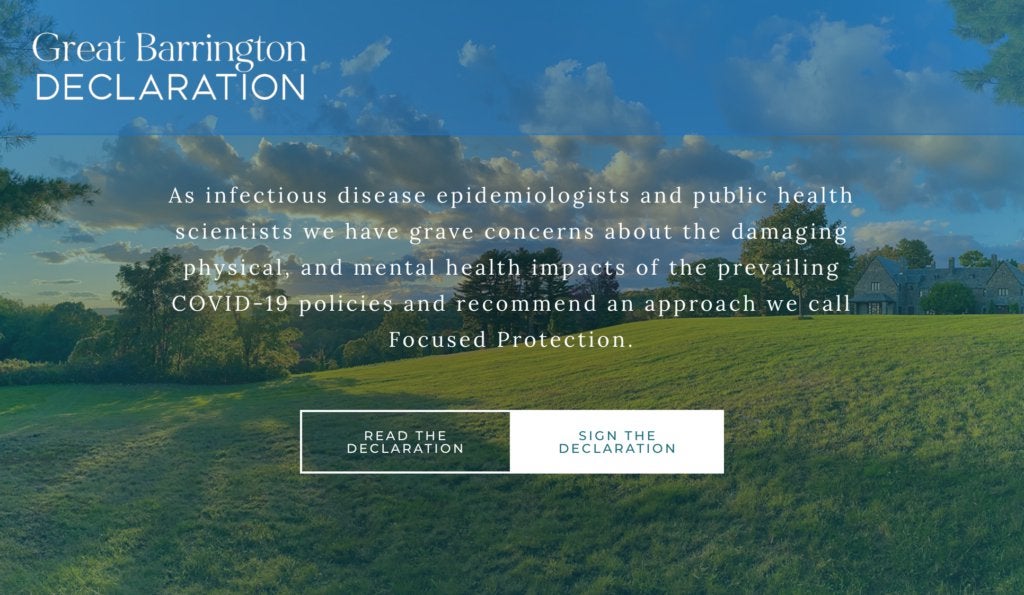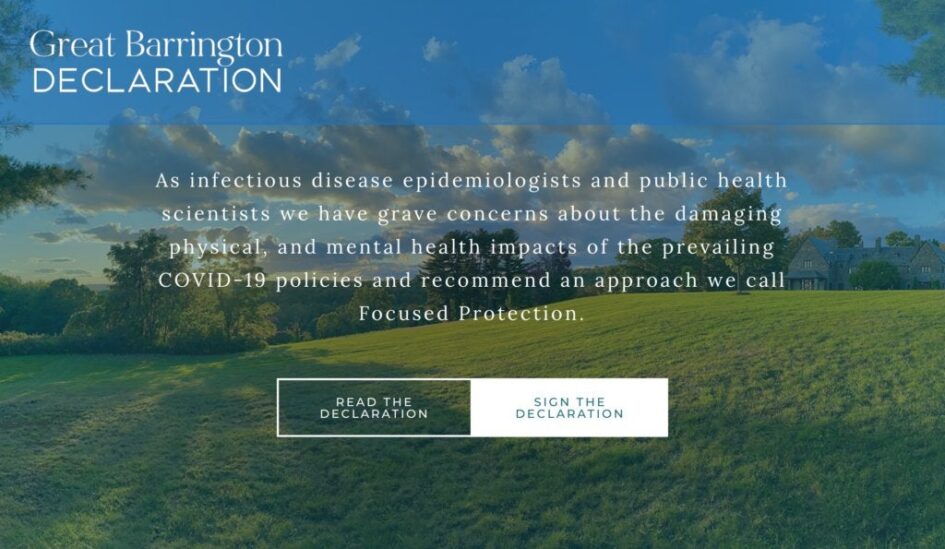The Great Barrington Declaration
Some of the world’s most distinguished doctors and public health scientists have called on governments to stop the lockdowns which have had such a devastating impact on Australia.
A public statement, known as The Great Barrington Declaration after the town in Massachusetts where it was drawn up, was authored by Dr. Martin Kulldorff, professor of medicine at Harvard University, Dr. Sunetra Gupta, professor at Oxford University and Dr. Jay Bhattacharya, professor at Stanford University Medical School.
At the time of writing the Declaration has been signed by more than 150,000 people:
Medical & Public Health Scientists 5 047
Medical Practitioners 9 741
General public 133 980
Aus 2 518
Canada 6 851
Germany 3 111
NZ 363
UK 69 653
USA 45 632
The move has received significant press coverage globally, including from the BBC and The Guardian.
Signatories include mover and shaker within the Australian medical profession Dr Guy Campbell, who has been urging the Australian Medical Association to fulfill its responsibilities and take a public stand against lockdowns.
Australia’s own Professor Ramesh Thakur of the ANU’s Crawford School of Public Policy, also a signatory, has had a profound impact on the debate in Australia, fulfilling his role as a public intellectual by backgrounding journalists across the political spectrum.
Unfortunately federal and state governments have ignored not just Thakur but many of the world’s leading epidemiologists, all of whom warn that lockdowns don’t work.
Instead Australian governments continue to shamelessly sow panic and confusion in the population for their own electoral advantage.
The Great Barrington Declaration in full
As infectious disease epidemiologists and public health scientists we have grave concerns about the damaging physical and mental health impacts of the prevailing COVID-19 policies, and recommend an approach we call Focused Protection.
Coming from both the left and right, and around the world, we have devoted our careers to protecting people.
Current lockdown policies are producing devastating effects on short and long-term public health.
The results (to name a few) include lower childhood vaccination rates, worsening cardiovascular disease outcomes, fewer cancer screenings and deteriorating mental health – leading to greater excess mortality in years to come, with the working class and younger members of society carrying the heaviest burden. Keeping students out of school is a grave injustice.
Keeping these measures in place until a vaccine is available will cause irreparable damage, with the underprivileged disproportionately harmed.
Fortunately, our understanding of the virus is growing.
We know that vulnerability to death from COVID-19 is more than a thousand-fold higher in the old and infirm than the young. Indeed, for children, COVID-19 is less dangerous than many other harms, including influenza.
As immunity builds in the population, the risk of infection to all – including the vulnerable – falls. We know that all populations will eventually reach herd immunity – i.e. the point at which the rate of new infections is stable – and that this can be assisted by (but is not dependent upon) a vaccine. Our goal should therefore be to minimize mortality and social harm until we reach herd immunity.
The most compassionate approach that balances the risks and benefits of reaching herd immunity, is to allow those who are at minimal risk of death to live their lives normally to build up immunity to the virus through natural infection, while better protecting those who are at highest risk.
THE GREAT BARRINGTON DECLARATION
Adopting measures to protect the vulnerable should be the central aim of public health responses to COVID-19. By way of example, nursing homes should use staff with acquired immunity and perform frequent PCR testing of other staff and all visitors. Staff rotation should be minimized. Retired people living at home should have groceries and other essentials delivered to their home. When possible, they should meet family members outside rather than inside.
A comprehensive and detailed list of measures, including approaches to multi-generational households, can be implemented, and is well within the scope and capability of public health professionals.
Those who are not vulnerable should immediately be allowed to resume life as normal.
Simple hygiene measures, such as hand washing and staying home when sick should be practiced by everyone to reduce the herd immunity threshold. Schools and universities should be open for in-person teaching.
Extracurricular activities, such as sports, should be resumed. Young low-risk adults should work normally, rather than from home. Restaurants and other businesses should open.
Arts, music, sport and other cultural activities should resume. People who are more at risk may participate if they wish, while society as a whole enjoys the protection conferred upon the vulnerable by those who have built up herd immunity.



7 Pingbacks